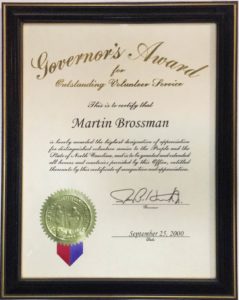
Martin Brossman with the Carolina Health and Humor Laugh-mobile – 2001
Humor in the Workplace
Humor to me is much more than telling a silly joke. It’s about a state of being, an attitude of looking for humor and joy in things. It’s about realizing that you can create humor and joy in just about any context. I learned this empirically during the years I volunteered at Duke Hospital taking a humor cart around to cancer patients. At first a volunteer with Carolina Health and Humor, I expanded my own humor horizon over several years as a volunteer trainer and certified humor presenter, grateful for the honor of receiving the Volunteer of the Year award from Governor Hunt in 2000. These years taught me that humor goes way beyond making someone laugh. One particular afternoon when I was first volunteering, I had taught a workshop for a group of very stressed-out corporate employees before heading to my volunteer shift. It was especially obvious to me that evening that most of the patients in the hospital beds were more alive and courageous than many of the people who had sat in the classroom with me earlier that day. There in the oncology ward, I met people who sometimes had very little time left, who were lit up by telling me a joke or wearing a Groucho nose-and-glasses on a head which had lost all its hair. As my experience grew, I began to teach the new volunteers coming to help out with our cart, The Laugh Mobile, that their job was not to entertain the patients. Our job was to bring compassionate humor into their rooms, allowing them to experience whatever they needed to experience, in the context of humor and joy. I created definitions of these concepts for the volunteers: Joy–a state of serenity that allows us to embrace whatever experience we are having in a constructive way. Compassionate humor–humor which creates a joyful environment that allows a person to have a greater sense of being accepted. But it was the individuals who taught me the far-reaching effects of even small doses of joy and compassionate humor. One particular woman needed a multiple organ transplants due to cancer. I made a balloon dog for her, telling her it knew two tricks, how to lay down and STAY when I taped it to the wall. She said, “ Maybe the dog could look out for organs for me.” I said, “ Great idea, let’s hang it up here on the wall so it can get a good view,” and attached the little blue balloon dog so that it overlooked the room. I enjoyed listening to her stories of her grandkids and then moved on to the next room, wearing my red clown nose; I announced myself at each room by knocking on the door and saying, “Can I come in? They just let me out.” When I returned two weeks later, I noticed she was gone. I was concerned about what happened to her, but the hospital could not tell us anything about the patients. During my rounds. I visited a man’s room and there on the wall was a slightly shrunken version of that blue balloon dog I had made two weeks before. I said, “I see you have a pet. I didn’t think they let pets in the hospital.” He told me that he was waiting for an organ transplant and a woman he met on the ward had gotten word that organs were available for her, so she had given him the watchdog that worked for her. Then he smiled. I realized that my balloon dog was a great example of what I was there for. Another time I walked into the room of an elderly woman who looked like she had been hit across the face with a baseball bat. The family was in the room, and you could have cut the sadness with a knife. Her eyes lit up a little bit when she saw me come in with my clown nose on. I explained the Laugh Mobile to her, asking if she would like to check out any humorous books and tapes. She saw I was really listening and answered, “I used to enjoy walking here in the halls before they had to remove my teeth due to cancer. I trusted instinct and said to her, “What are you going to say the next time you walk around the halls?” It caught her slightly off guard in a good way, and she sat up in bed with a smile and pointed over her shoulder. She said, “You ought to see the other guy. It was a heck of a fight!” The family members also sat up, in a shock at the change in her state. You see, I was listening for humor and not trying to entertain her. What does this have to do with humor in the workplace? Everything. Because at work we so often become overburdened with significance, losing track of the more important things in life and forgetting that all of that could change in a moment. Many times I entered the oncology ward tired or in an off mood, but I never left it that way. It reminded me of the importance and the responsibility I have to bring joy and humor into my own life, versus waiting for someone to entertain me. For years I used to carry a clown nose in my car and would put it on if someone seemed to be suffering from too much anger. The Laugh Mobile taught me a few things about humor and the workplace. 1. The value of listening for humor in other people. This doesn’t mean inappropriately laughing at something that is painful to them. It’s an attitude of looking for opportunities at work and in life to laugh together. Humor is like a muscle that atrophies if you don’t use it. 2. The importance of being able to laugh at yourself. If you haven’t noticed, you are human. We, humans, do silly things with our emotions and biological brains, so you will get over things more quickly if you can laugh at yourself. 3. The wisdom of compassionate humor in leadership. Some people believe that leadership and humor don’t go together. Yet look at some of the most effective and compassionate leaders you have known in your own life. I am sure you can recall a time when they were able to laugh at themselves. And the most memorable leadership quality is a compassionate perspective that permits the type of real unconditional listening that allows talent, contribution—and yes, actual workplace joy—to flourish. I love to hear your views on humor in the comments below.

Volunteer of the Year Award to Martin Brossman for my work with the Laugh Mobile
Want to bring more humor and joy to your group, association or workplace? HIre Martin for his program on it: Instant Humor Just Add Life. To schedule time with him contact us at https://martinbrossmanspeaks.com/hire-martin/ or call 919-847-4757 – To explore more of Martin’s professional talks see: https://martinbrossmanspeaks.com/
